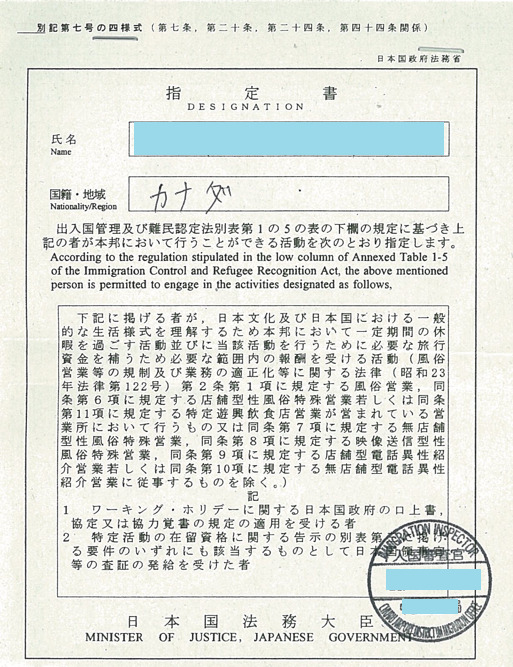Hello, this is Hong from IMS Legal Professional Corporation. According to the announcement by the Chinese Ministry of Foreign Affairs on October 23, 2023, the "Hague Convention Abolishing the Requirement of Legalisation for Foreign Public Documents," which China joined on March 8, 2023, came into effect between China and Japan on November 7. As a result, consular authentication by the Chinese Embassy or Consulate--which was previously required when sending documents within the scope of the convention issued by treaty-signing countries like Japan to China--is no longer necessary. For details on the application process for apostille, please refer to the Ministry of Foreign Affairs guide https://www.mofa.go.jp/mofaj/toko/page22_000610.html.
Now, let's discuss what happens if someone on a working holiday in Japan is offered full-time employment by a Japanese company and wishes to work under such conditions. We'll also explore whether it's possible to remain on the working holiday visa or if a change of visa status can be applied for. Firstly, let's briefly explain what the "working holiday" is.
Working Holiday System
The working holiday programmes are, based on bilateral arrangements, intended to make it possible for the youth of Japan and its partner countries/regions to enter each country/region primarily for the purpose of spending holidays while allowing them to engage in employment as an incidental activity of their holidays for the purpose of supplementing their travel funds.
The programmes are designed to provide the youth with wider opportunities for them to appreciate the culture and general way of life in the partner countries/regions for the purpose of promoting mutual understanding between Japan and its partner countries/regions. (Excerpted from the Ministry of Foreign Affairs website)
Activities are Specified in the "Designation Certificate"
The working holiday visa is generally applied for at the Japanese Embassy or Consulate in the applicant's country. Upon entering Japan, the individual goes through immigration, and the status of residence called "Designated Activities (Designation Certificate No. 5)" is granted. The passport is then attached with a document called the "Designation Certificate," specifying the allowed activities.

Can You Work Full-Time on a Working Holiday?
Now, after the preamble, if someone on a working holiday in Japan receives an offer from a company and decides to work full-time, there may be concerns about the status of residence. While working on a working holiday is generally allowed, transitioning to full-time employment changes the dynamics, and attention is required.
The designated activities for a working holiday are defined as follows:
- Spending a certain period on vacation in Japan to understand Japanese culture and general lifestyles.
- Receiving remuneration within the necessary range to supplement travel funds for the above activity.
Although there is no specific regulation limiting the hours of work, the activities are framed as supplementing travel funds within the necessary range for taking a vacation. Therefore, working full-time, in contrast to the spirit and purpose of the working holiday, might not be considered appropriate, even though it doesn't lead to illegal employment.
If you intend to work full-time, it's essential to assess whether there is a suitable residence status for the intended job duties and whether you meet the application requirements. However, not everyone on a working holiday can apply for a change of status. Some nationalities, like Canadian or German, may be eligible for a change, while others might not be allowed to apply and may need to return to their home country. These determinations are based on bilateral agreements, which vary by country or region and are implemented through oral representations, agreements, or Ministry of Foreign Affairs documents.
If it's possible to apply for a change of status, you can submit an application to immigration, obtain approval for the new work status, and then work full-time. If a change is not possible, you may consider collaborating with your employer to apply for a "Certificate of Eligibility (COE)" for designated activities, obtain a visa in your home country, and then return to Japan.
In any case, if you are on a working holiday in Japan and plan to work for a Japanese company in the future, it is advisable to consult with immigration or a professional in advance.
For more information, please contact us below ↓
https://imsvisa.support/en/contact/





